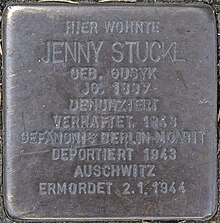Jenny Stucke
Jenny Stucke (born Gusyk; born May 29, 1897 in Wilkowischky, today Vilkaviškis , Lithuania ; † January 2, 1944 in Auschwitz concentration camp ) was a Jewish and politically left-wing woman with Turkish citizenship who was the first student and foreigner at the university was enrolled in Cologne . She was murdered in Auschwitz.
Life
Jenny was the first child of the married couple Leon and Diana Gusyk, b. Kawan, who at that time lived in the small town of Wilkowischky in the Tsarist Suwałki Governorate of the Russian-occupied Congress Poland . Because of the pogroms that had intensified since the attack on Alexander II , the family moved west to Graefrath near Solingen in 1911 , where their father bought a steel goods factory and traded cutlery . Since he was born in Constantinople , which was noted in his passport, he was able to claim Ottoman / Turkish citizenship for himself and his family in 1913 in order to avoid anti-Jewish-Russian resentment.
In October 1918, her mother and, a day later, her 16-year-old brother Paul died of the Spanish flu epidemic, which was rampant around the world . Her two remaining siblings then moved to live with her sister in Cologne. Her father abandoned the factory, which his daughter now handle had. He moved to Berlin.
education
After completing secondary school at the Lyceum on Friedrichstrasse, which later became the August-Dicke-School , and a subsequent commercial apprenticeship with an assistant examination at the Barmer Bankverein , Jenny Gusyk attended the Cologne Commercial College from the summer of 1917 . With their inclusion in the newly founded university, she was the first student and foreigner at the Faculty of Economics and Social Sciences. She closed after seven semesters in the winter term 1920/21 her degree in business administration with a minor in economic history and a thesis on the socialist and pacifist Jean Jaurès as a business graduate with honors, the only woman among 51 graduates. During her studies she called herself “Genia” in admiration for the feminist ideas of the Russian writer and later the world's first diplomat Alexandra Michailovna Kollontai . Her dissertation was not accepted by the conservative doctoral supervisor Christian Eckert , because it was "too communistically penetrated".
Persecution and death
Jenny Gusyk now moved to her father in Berlin, where she worked as an accountant and married the left-wing journalist Karl Stucke , who mainly wrote for the communist party newspaper Die Rote Fahne . Their only son (Hans) Thomas was born on November 27, 1927. In 1933 Karl Stucke was taken into protective custody and taken to a concentration camp; Arrested again in 1939 and sent to Sachsenhausen concentration camp, he died there on January 14, 1940. With that, Jenny lost all possible rights from this mixed marriage . So at risk, she went into hiding, but stayed in Berlin, probably out of concern for her old father, who only died in January 1943 in the old people's home of the Jewish community in Berlin , while her sister Rebekka was still in 1942 with an exit visa via France and Portugal the USA could leave. In 1943 she was no longer able to use her own visa, which she had had for herself and her son since the spring of 1940. After being denounced, she was taken to the Gestapo prison at Prinz-Albrecht-Strasse in June 1943 . After being transferred a few times, like her brother Max and his wife Lydia before, she was deported to Auschwitz , where she was murdered on Sunday January 2, 1944. Her son Thomas survived in Berlin thanks to the help of his father's friends and left in October 1946 to live with his aunt in New York; he died in 2013.
Honors
The reading and handbook for female students, published by the Equal Opportunities Commissioner at the University of Cologne, is titled in honor of Jenny, whose nickname is Genia .
Since 2009, the University of Cologne has been awarding an annual equality prize of 5000 euros for projects within the university to promote equal opportunities for women and men, which, with the approval of their son, who lives in New York State, has been named the "Jenny Gusyk Prize “Received.
The city of Solingen had a stumbling block laid by the artist Gunter Demnig in Wuppertaler Straße 36, their last place of residence there . Stumbling blocks for Max and Lydia Gusyk are in Berlin-Köpenick , Hirschgartenstraße 2.
The Solingen writer and former secondary school teacher Wilhelm Rosenbaum, recipient of the Rhineland Taler , wrote her biography in 2003 based on the 1995 publication by Marina Wittka.
literature
- Marina Wittka: History of Women's Studies . In: Women's representative of the University of Cologne (ed.): Genia - Only for women . m & t Verlag, Cologne 1995, ISBN 3-9804489-0-8 , p. 13-96 .
- Wilhelm Rosenbaum: Jenny Gusyk. Jew, Turkish, Solinger. The biography of the first female student at the University of Cologne. Solingen (City Archives), 2003, ISBN 3-928956-13-2 .
Web links
- Jenny Gusyk at Stadtarchiv Solingen (accessed January 2020)
Individual evidence
| personal data | |
|---|---|
| SURNAME | Stucke, Jenny |
| ALTERNATIVE NAMES | Gussy, Jenny (maiden name) |
| BRIEF DESCRIPTION | Turkish person; first student and foreigner at the University of Cologne |
| DATE OF BIRTH | May 29, 1897 |
| PLACE OF BIRTH | Vilkaviškis , Suwałki Governorate , Russian Empire |
| DATE OF DEATH | January 2, 1944 |
| Place of death | Auschwitz concentration camp , occupied Poland |
